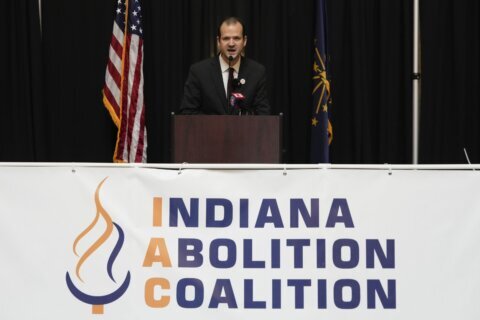ATLANTA (AP) — Four years ago, Georgia was at the center of former President Donald Trump ’s attempts to overturn his loss to Democrat Joe Biden. Democrats worry that Trump is at it again, even before the first votes have been cast.
Many Democrats in the crucial swing state believe Trump-aligned Republicans are laying the groundwork for another attempt to undermine the vote should the GOP nominee narrowly lose in November, this time by manipulating election rules.
The turmoil springs from a takeover of the Georgia State Election Board earlier this year by Trump allies after Republican lawmakers yanked the secretary of state, who had resisted Trump’s efforts to subvert the election in 2020, off the panel. The new majority started making election rule changes that have alarmed Democrats, legal experts and democracy advocates.
One provides for an undefined “reasonable inquiry” before county election officials certify results, while another allows county election officials “to examine all election related documentation created during the conduct of elections.” Critics say those rules could be used by county officials who want to refuse certification, igniting a legal firestorm at a time when statewide results would need to be certified.
State Rep. Saira Draper, an Atlanta Democrat who was the party’s state director of voter protection in 2020, said hindering a final statewide tally may not even be Republicans’ main goal.
“It’s not about whether they’re successful in stopping certification,” she said. “It’s about injecting enough confusion to the process that you have a significant segment of the population that will not accept the results. I think they’re going to meet that goal regardless of what these judicial opinions say.”
Despite widespread criticism, the board is scheduled to consider nearly a dozen additional rules when it meets Friday.
The board members pushing the changes say they’re trying to ensure the accuracy of the vote and dismiss concerns about attempts to delay or block certification.
“The possibility of that happening now that they have more information is just not likely,” board member Janelle King said. “It’s creating a narrative that doesn’t exist.”
The controversy playing out in Georgia has national implications, since the presidential race is expected to be narrowly decided by voters there and in six other swing states. Disrupting certification of election results, a once routine process that Trump politicized through his lies about the 2020 election, could hinder states’ ability to meet deadlines for their electoral votes to be counted.
But some legal experts say the doomsday scenario of Republican-dominated local election boards refusing to certify vote counts and preventing Georgia from certifying its totals by an early December deadline remains improbable. That’s because state law and court precedent firmly state that county officials can’t unilaterally discard votes and “shall certify” by deadlines written into state law, no matter how much local board members might distrust their results.
“There is no wiggle room for local certifying officials to take matters into their own hands,” said Lauren Miller Karalunas, a legal historian at New York University’s Brennan Center. “Their only duty during certification is to sign off on the completeness of the results.”
The state board has no direct role in determining election results, but instead writes rules to ensure that elections run smoothly and hears complaints about violations.
Growing Democratic anxiety over the board majority and its actions mushroomed after Trump praised the majority members by name during an Aug. 3 rally in Atlanta, calling them “pit bulls fighting for honesty, transparency and victory.”
Trump’s focus on the administrative board shows how battles over voting and ballot-counting are a tool that both major parties use to motivate voters in Georgia. Many Democrats say protecting the right to vote is a key issue that particularly motivates Black voters. But it’s also a driver for Republicans, with state Republican Party Chairman Josh McKoon praising the takeover of the board in May. He later emailed proposed rules to board members and others, including an election integrity adviser at the RNC.
Many of the rules come from grassroots Republicans linked to a national web of election integrity advocates connected to lawyer Cleta Mitchell, who was on a call Trump made in January 2021 urging Republican Secretary of State Brad Raffensperger to help him “find” the votes needed to overturn his loss in Georgia.
“Forces undermining the security of our elections argue that counties must certify election results no matter what — even if they are fraudulent and illegitimate,” the RNC said in a statement last month. “The Establishment is fighting hard against these rules because they want to keep election systems that are easy to manipulate, with no transparency and no checks in place to prevent cheating.”
To be clear, there was no widespread fraud in Georgia’s 2020 elections. While Atlanta’s Fulton County has admitted double-scanning some ballots during a 2020 recount, those errors if anything benefitted Trump. Georgia’s votes for president were counted three times, including one by hand, and each affirmed Democrat Joe Biden’s win. Recounts, reviews and audits in the other battleground states where also clearly affirmed Trump’s loss.
In a lawsuit seeking to declare the rules invalid, Democrats argue the state election board exceeded its legal authority. A trial is set for Oct. 1. A conservative group led by a former Republican state lawmaker also has filed a lawsuit saying the board is improperly using rules to encroach on the Legislature’s authority to make laws.
Opponents of the board’s majority also are trying to get Republican Gov. Brian Kemp to remove the three Trump-aligned members, alleging ethics violations. The governor so far hasn’t acted.
With less than two months until Election Day and mail ballots already going out to military and overseas voters, county election officials say it’s too late for new rules. The Georgia Association of Voter Registration and Election Officials has been repeatedly critical of many of the proposed changes, saying they provide little benefit, duplicate efforts of already-required procedures or invite local boards to refuse to certify results.
Karen Glenn, an election official in Butts County, located south of Atlanta, said she thought it was “very irresponsible” for the board to be pushing new rules on counties as local governments prepare for an election that could see record turnout.
“We have a lot to do to prepare, so to implement a new rule right now, we have to stop, learn that,” Glenn said in an interview at a training meeting for election officials last month. “It’s just too close. It could lead to mistakes, and we don’t want to make mistakes. We already have low public confidence as is, so that only hurts us.”
Some Republicans argue that county election boards can decline to certify election results. A Republican-appointed Fulton County board member is asking a judge to affirm that position in a lawsuit. But court decisions in Georgia and nationwide say officials can’t refuse.
“That has been asked and answered hundreds and hundreds of times over more than a century,” said Karalunas of the Brennan Center.
Certifying Georgia’s statewide vote in November is the job of Raffensperger and Kemp, not the State Election Board. Raffensperger, a Republican, has repeatedly signaled he will push counties to comply and called their duty to certify “very clear and black-letter law.”
“We fully expect them to do their job.” he said.
Copyright © 2024 The Associated Press. All rights reserved. This material may not be published, broadcast, written or redistributed.






